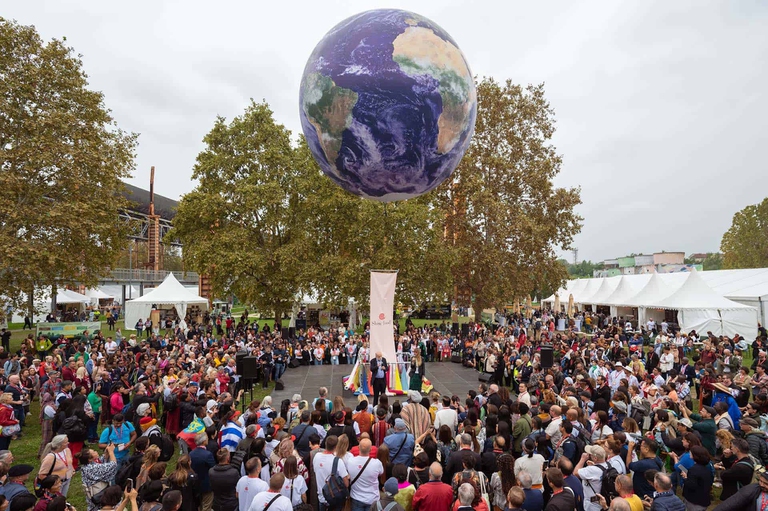https://www.lifegate.it/terra-madre-2024-agricoltura
- |
Like a team of superheroes, Slow Food, Legambiente And FederBio have joined forces to launch a loud and clear appeal:transform the current agricultural system towards a model that puts environmental sustainability, social equity and biodiversity at the centre.During the 2024 edition of Terra Madre Salone del Gusto, the presidents of the three organizations – Barbara Nappini (Slow Food Italia), Maria Grazia Mammuccini (FederBio) and Stefano Ciafani (Legambiente) – underlined how theagriculture can and must become a driver of change.

From Terra Madre, an appeal to politics
Agriculture is a fundamental lever for addressing climate and social challenges.“Slow Food has been defined as the farmers' UN.I like this expression,” Nappini declared during the press conference presentation of the road map addressed to the Italian government and the international partners of G7 Agriculture, held in conjunction with Terra Madre in Syracuse and where they are missing precisely crucial topics such as agroecology and references to the European Farm to Fork strategies, Biodiversity 2030 and the important targets of the Kunming-Montreal Global Biodiversity Framework.
The objective of this road map is anything but short term:the gaze is turned to future centuries.At the heart of six proposals they are found onagroecology and the biological as alternatives to intensive agriculture, considered unsustainable for the environment and human health.“Organic not only protects biodiversity, but regenerates soils and promotes a fairer economic model,” said Mammuccini.
Proposals include:
- Promote agroecology as an agricultural model, eliminating the use of harmful pesticides such as glyphosate and encouraging sustainable practices;
- support organic farming to reduce negative impacts on the environment and improve workers' conditions;
- encourage respectful breeding of animals and the ecosystem, reducing the intensity of industrial livestock farming;
- introduce nutrition education in schools to raise young people's awareness of the importance of food and sustainability;
- reduce food waste along the entire supply chain, promoting circular economy models;
- fight gangmastering and social injustices, ensuring rights and dignity for agricultural workers.
The transition towards agroecology
Mammuccini underlined the importance of organic agriculture, recalling that Italy has set itself theobjective of allocating 25 percent of agricultural surfaces to organic farming by 2027, with particular attention to involving young people in the sector.According to data from the Crea Bioreport, a quarter of organic entrepreneurs are under 40 years old, a positive signal for the future of sustainable agriculture.
Stefano Ciafani highlighted the need for coordinated action at national and international level:“At the G7 we ask for concrete commitments to abandon harmful agricultural practices and support those who produce food in a sustainable way”.Among the requests, the introduction of binding policies stands out to reduce dependence on pesticides and chemical fertilizers, protecting the health of soils and ecosystems.Ciafani also criticized the proposal of the Minister of Agriculture Francesco Lollobrigida introduce the agricultural civil service at 500 euros per month:“Civil service is an extraordinary life experience, but it is wrong to convey the message that it is a way to employ underpaid agricultural labour.”
The final message from the three associations from the Terra Madre stage is clear: agriculture can be the key to a more sustainable future, but it requires a paradigm shift.It is not just about protecting the environment, but also about ensuring social justice, dignity for workers and well-being for future generations.“There is no more time for partial solutions,” added Mammuccini.“The future of agriculture and our planet requires immediate and coordinated action.Farmers must be able to rely on their own income, without basing their survival exclusively on subsidies."
"We have to abandon the logic based only on profit and adopt a perspective bio-logic”, is Nappini's conclusion.“a logic centered on life, which allows us to perceive ourselves as part of Nature, which protects biodiversity, soil fertility, natural resources:the only riches truly capable of saving us.In the process of changing the paradigm, food education is central, which we ask, in particular the Italian Government, to include as a curricular subject for all school students of all levels.Finally, we believe that it is essential to establish the right of all peoples to determine their own food and agricultural policies:food sovereignty.We urge this to the world leaders who gathered in Syracuse."
The appeal of the three organizations is addressed not only to the Italian government, but also to the international community: radical change is possible and necessary, as long as it is supported by courageous policies and the desire to abandon an obsolete agricultural system.
